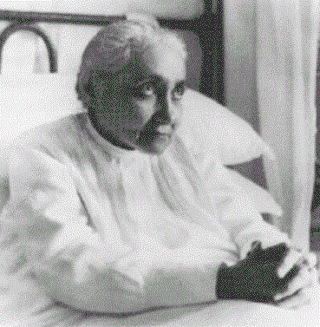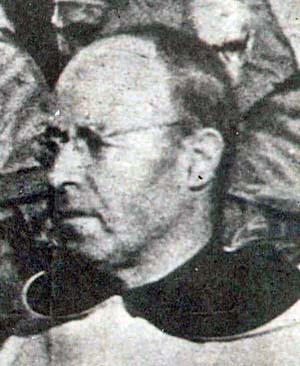
Nihil obstat (Latin for 'nothing hinders' or 'nothing stands in the way') [1] is a phrase traditionally used by Catholic Church authorities to formally declare that there is no objection to the publication of a book.

Nihil obstat (Latin for 'nothing hinders' or 'nothing stands in the way') [1] is a phrase traditionally used by Catholic Church authorities to formally declare that there is no objection to the publication of a book.
The phrase nihil obstat is used by a Catholic cleric known as a Censor Librorum (Latin for 'censor of books') to indicate that a book contains nothing contrary to Catholic doctrines, faith, or morals. [1] Canon law requires this approval for the publication of books by faithful Catholics if they "touch upon matters of faith and morals", and requires that pastors enforce this rule. [2] The Censor Librorum is delegated by a bishop to review the text in question over approximately two months. [3] If an author is a member of a religious institute, such as a monastery, and the book concerns religion or morals, then canon law further requires the imprimi potest ('it can be printed') of the major superior before publication. [4] Finally, the bishop of the author's diocese or of the place of publication gives the final approval, the imprimatur ('let it be printed'). [5]

The Index Librorum Prohibitorum was a changing list of publications deemed heretical or contrary to morality by the Sacred Congregation of the Index ; Catholics were forbidden to print or read them, subject to the local bishop. Catholic states could enact laws to adapt or adopt the list and enforce it.

Sede vacante refers, in the Canon Law of the Catholic Church, to the state during which a diocese or archdiocese is without a prelate installed in office, with the prelate's office being the cathedral. The term is used frequently in reference to papal vacancies occurring upon the Pope's death or resignation.

Raymond Edward Brown was an American Sulpician priest and prominent biblical scholar. He was a specialist on the hypothetical Johannine community, which he speculated contributed to the authorship of the Gospel of John, and he also wrote studies on the birth and death of Jesus.
An imprimatur is a declaration authorizing publication of a book. The term is also applied loosely to any mark of approval or endorsement. The imprimatur rule in the Catholic Church effectively dates from the dawn of printing, and is first seen in the printing and publishing centres of Germany and Venice; many secular states or cities began to require registration or approval of published works around the same time, and in some countries such restrictions still continue, though the collapse of the Soviet bloc has reduced their number.
The Catholic Church first prohibited Catholics from membership in Masonic organizations and other secret societies in 1738. Since then, at least eleven popes have made pronouncements about the incompatibility of Catholic doctrines and Freemasonry.
Imprimi potest or imprimi permittitur is a declaration by a major superior of a religious institute of the Catholic Church that writings on questions of religion or morals by a member of the institute may be printed. Superiors make such declarations only after censors charged with examining the writings have granted the nihil obstat, a declaration of no objection. Final approval can then be given through the imprimatur of the author's bishop or of the bishop of the place of publication.

Alan of the Rock was a Dominican friar and priest, mystic and theologian. He is especially notable for his contributions to the Catholic devotion of the Rosary. Some writers claim him as a native of Germany, others of Belgium; but his disciple, Cornelius Sneek, says that he was born in Brittany. He died at Zwolle.

In Christian theology, a private revelation is an instance of revelation, in a broader sense of the term, of divine reality to a person or persons. It contrasts with revelation intended for humanity at large, which is sometimes termed public revelation.

In the Catholic Church, a bishop is an ordained minister who holds the fullness of the sacrament of holy orders and is responsible for teaching doctrine, governing Catholics in his jurisdiction, sanctifying the world and representing the Church. Catholics trace the origins of the office of bishop to the apostles, who it is believed were endowed with a special charism and office by the Holy Spirit at Pentecost. Catholics believe this special charism and office has been transmitted through an unbroken succession of bishops by the laying on of hands in the sacrament of holy orders.
The Poem of the Man-God is a work on the life of Jesus Christ written by Maria Valtorta. The current editions of the work bear the title The Gospel as Revealed to Me.
Roman Danylak was a Canadian Ukrainian Catholic bishop.

A Catholic funeral is carried out in accordance with the prescribed rites of the Catholic Church. Such funerals are referred to in Catholic canon law as "ecclesiastical funerals" and are dealt with in canons 1176–1185 of the 1983 Code of Canon Law, and in canons 874–879 of the Code of Canons of the Eastern Churches. In Catholic funerals, the Church "seeks spiritual support for the deceased, honors their bodies, and at the same time brings the solace of hope to the living." The Second Vatican Council in its Constitution on the Liturgy decreed: "The rite for the burial of the dead should express more clearly the paschal character of Christian death, and should correspond more closely to the circumstances and traditions found in various regions."

The term Catholic Bible can be understood in two ways. More generally, it can refer to a Christian Bible that includes the whole 73-book canon recognized by the Catholic Church, including some of the deuterocanonical books of the Old Testament which are in the Greek Septuagint collection, but which are not present in the Hebrew Masoretic Text collection. More specifically, the term can refer to a version or translation of the Bible which is published with the Catholic Church's approval, in accordance with Catholic canon law. The current official version of the Catholic Church is the Nova Vulgata.

Luisa Piccarreta, TOSD, also known as the "Little Daughter of the Divine Will",, was a Catholic mystic and member of the Third Order of Saint Dominic. Her writings and spirituality centred on union with the will of God.

The 1983 Code of Canon Law, also called the Johanno-Pauline Code, is the "fundamental body of ecclesiastical laws for the Latin Church". It is the second and current comprehensive codification of canonical legislation for the Latin Church of the Catholic Church. The 1983 Code of Canon Law was promulgated on 25 January 1983 by John Paul II and took legal effect on the First Sunday of Advent 1983. It replaced the 1917 Code of Canon Law which had been promulgated by Benedict XV on 27 May 1917. According to canon 6, the 1983 code of canon law abrogates the 1917 code of canon law and any penal laws made under it that are not contained in the 1983 code.

There are seven sacraments of the Catholic Church, which according to Catholic theology were instituted by Jesus Christ and entrusted to the Church. Sacraments are visible rites seen as signs and efficacious channels of the grace of God to all those who receive them with the proper disposition.
A particular church is an ecclesiastical community of followers headed by a bishop, as defined by Catholic canon law and ecclesiology. A liturgical rite, a collection of liturgies descending from shared historic or regional context, depends on the particular church the bishop belongs to. Thus the term "particular church" refers to an institution, and "liturgical rite" to its ritual practices.

Religious censorship is a form of censorship where freedom of expression is controlled or limited using religious authority or on the basis of the teachings of the religion. This form of censorship has a long history and is practiced in many societies and by many religions. Examples include the Edict of Compiègne, the Index Librorum Prohibitorum and the condemnation of Salman Rushdie's novel The Satanic Verses by Iranian leader Ayatollah Ruhollah Khomeini.

The Very Reverend John Patrick Kenneth Leahy, O.Carm. D.Ph. S.T.M. was a Roman Catholic priest, Prior of the Carmelite College of Pius XI, Assistant General and Procurator General of the Carmelite Order, and a Professor of Moral Theology in Rome.

In canon law, a canon designates some law promulgated by a synod, an ecumenical council, or an individual bishop.